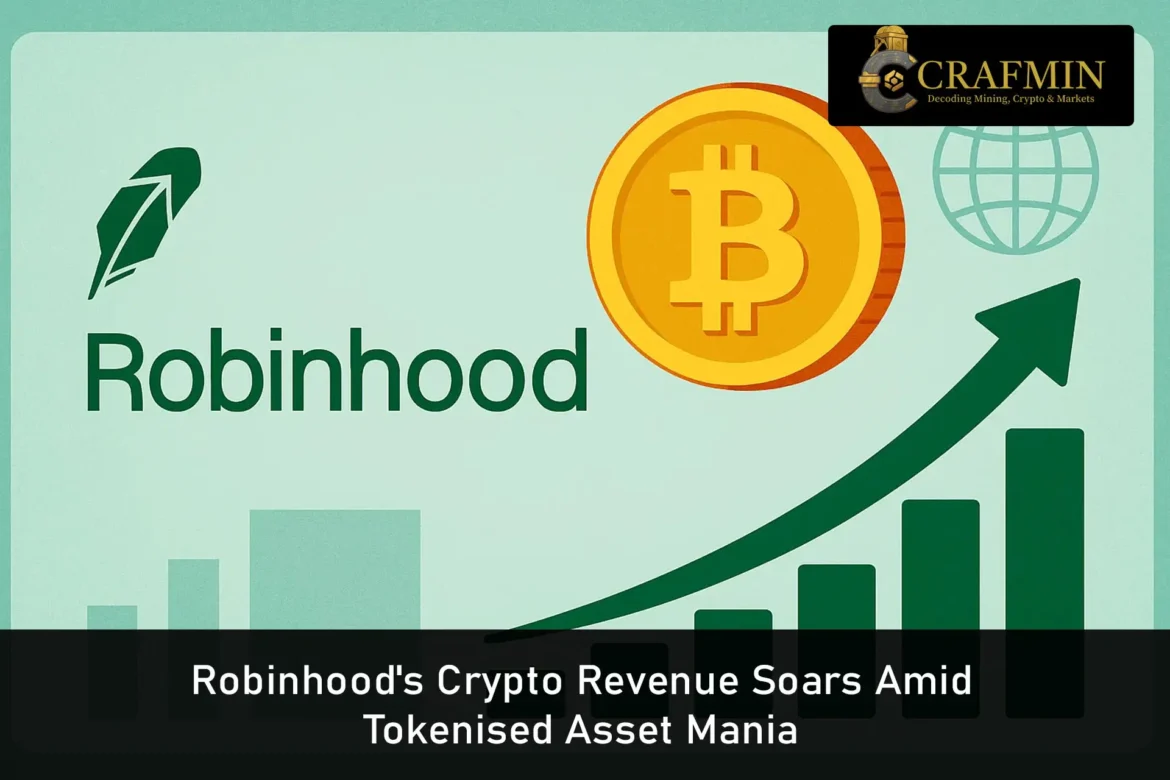Robinhood recorded a historic Q2 2025 cryptocurrency revenue hike, a strategic departure from its long-term growth plan. Cryptocurrency revenue leaped to US$160 million, a whopping 98% year-over-year growth compared to the same quarter last year, the brokerage firm said. The spike is mainly attributed to its listing of tokenised stock products on the Robinhood Chain and its recent acquisition of European crypto exchange Bitstamp.
JUST IN: Robinhood total revenue climbed 45% year-on-year to $989M with its crypto revenue nearly doubling to $160M in Q2 2025. pic.twitter.com/VImonZSJsA
— Cointelegraph (@Cointelegraph) July 31, 2025
Revenue was US$989 million, a 45% rise, and net income was US$386 million, twice Wall Street’s expectations. Robinhood’s foray into tokenised finance has captivated investors while regulators began scrutinising its activities.
Tokenised Stocks: The New Growth Driver
Robinhood has also identified tokenisation as the finance revolution today. Its own platform, Robinhood Chain, hosts more than 200 tokenised US stocks, from leading private companies such as SpaceX and OpenAI. Even though the platform doesn’t profess to offer ownership in such private companies, it does provide exposure to the same in the form of derivative-like assets.

Tokenised stocks are fuelling Robinhood’s next phase of growth ( Image Source: CCN )
Despite investors’ demand, warning signs have been there. Red flags have been raised. OpenAI merely credited that it had no official relationship with tokens carrying its name. Then Lithuanian authorities initiated an inquiry into consumer protection and transparency behind the issuance.
Robinhood CEO Vlad Tenev labeled tokenisation “the most exciting innovation of the last decade,” allowing investors worldwide to gain fractional exposure to iconic assets once reserved for accredited or institutional investors.
Robinhood completed its acquisition of Bitstamp in June for around US$200 million, a strategic move to increase its global regulatory presence and strengthen its grip on European markets. Bitstamp brought about around US$7 billion of quarterly trading volume, which provided scale and legitimacy to Robinhood’s crypto business.
The acquisition also lays the groundwork for the platform’s crypto staking product, under which customers can earn returns on tokens like Solana (SOL) and Ethereum (ETH). It is one of the more speculative forays Robinhood has made into decentralised finance (DeFi), and somewhat more than a retail trading app.
Robinhood’s pushy conduct has not escaped scrutiny. European authorities, such as the central bank in Lithuania, have raised an eyebrow about the tokenised equity product design and promotion. It is all about whether investors are really well-advised on what they purchase, particularly if the underlying assets are not traditional securities or equity shares.
Price is perhaps the most fundamental concern for regulators. Some tokens are said to trade at ridiculous premiums or discounts to their true value out there in the real world, and this threatens market integrity and investor trust.
Experts sound a warning note that while tokenisation promises well for the future, success will be based on effective regulation and proper investor disclosure. Robinhood must now weigh innovation against compliance.
Why the Strategy Still Matters
Even as regulatory pressure mounts, Robinhood’s growth through tokenisation reveals an unfolding model coming of age. The company is transforming from a meme stock-trading app to a multifaceted, full-service crypto-finance titan. Through the inclusion of foreign customers in tokenised offerings, the launch of staking products with yields, and the strategic purchase of infrastructures like Bitstamp, Robinhood sets itself up to be an anchor company in connecting traditional markets to digital markets.
For both institutional and retail investors, Robinhood’s speedy approach is a sign of confidence in blockchain use over tokenized speculation in the long term.
What Next for Robinhood
Several factors will be crucial in deciding whether Robinhood can maintain the momentum:
- Lithuania’s and other EU regulators’ eventual regulatory conclusions over tokenized equities
- Rates of user adoption of Robinhood Chain, particularly in Europe
- The company’s next step towards tokenising additional assets including property and private equity
- Crypto staking solutions and staking yields on Ethereum and Solana adoption
They will either solidify the position of Robinhood as an innovator, or reveal the limits of risky tokenisation to an evolving regulatory environment.
Also Read: Bitcoin Resilient at $118K as Fed Leaves Rates Unchanged and Traders Watch Tariffs
Takeaway: Cautious Optimism for a Crypto New World
Robinhood’s Q2 2025 results are easily proof of strength in offering crypto services, tokenized stocks, and geographic diversification. Doubling revenue from cryptocurrencies simply reflects growing demand for decentralized access to assets.
But with caution. European regulators are watching closely, and blunders would ruin its run. Robinhood’s success relies not just on innovation, but on doing the right thing globally on transparency, risk, and investor protection.
Do it right, and Robinhood can establish a new benchmark for mainstream crypto adoption and bring Wall Street together with the blockchain economy.

